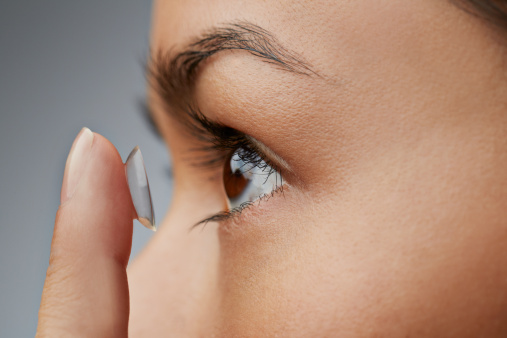
If you’re a regular wearer of contact lenses, you’ve probably been warned about the health hazards of leaving them in too long and washing them improperly (or infrequently). But a recent study from NYU Langone Medical Center’s a gross reminder about why it really is a bad idea to use unwashed fingers to pop them out or sleep in them (as tempting as that may be when you’re sooo tired): It found people who wear contacts have different types of bacteria in their eyes than non-users—including one kind often connected with eye ulcers. (Ouch.)
For this small study, researchers swabbed the eyes of 20 subjects—9 contacts-wearers and 11 non-users—to examine the types of bacteria there. Those who wear contacts had a higher number of four species: Lactobacillus, Acinetobacter, Methylobacterium, and Pseudomonas, the last of which is commonly linked to corneal ulcers.
“There has been an increase in the prevalence of corneal ulcers following the introduction of soft contact lenses in the 1970s,” study co-author Jack Dodick, MD, and professor of ophthalmology at NYU Langone noted in a press release. “Because the offending organisms seem to emanate from the skin, greater attention should be directed to eyelid and hand hygiene.”
So what can you do to keep your eyes infection-free? We asked Steven Shanbom, MD, an ophthalmologist in Berkeley, Michigan, for a quick primer:
Clean your hands, then the lenses
Be sure to wash your hands with soap before you handle your contacts. Then rid the lenses of harmful dirt and bacteria by putting them in the (now spotless) palm of your hand, followed by some cleaning solution, then gently rubbing the solution into the lens. (Note: Even if your solution bottle says “No Rub” on it, you’ll get much more sanitary lens if you do.)
Consider different contacts
Dr. Shanbom sees daily disposable soft lenses as a good way to avoid these issues. “There’s only so much gunk and bacteria that can get into the eye when you’re using a new set of contacts every day,” he says. And if you’re less than diligent about cleaning your contacts, what could be easier than never having to do it ever again?
Give ’em a rest
The best way to avoid a bout of pink eye or something more severe, however, is wear glasses when you can to limit your eye’s exposure to lenses. Dr. Shanbom advises wearing your contacts only during the work day, and sticking to glasses at home and on the weekends, limiting your lenses to 12-14 hours a day at the most. (And never swim with your contacts in, since pool water’s teeming with infectious bacteria just waiting to glom onto them. Ew.) The upside: With the recent resurgence of glasses as a cool accessory, you’ll be right on trend.
This article originally appeared on Health.com.
More from Health.com:
More Must-Reads from TIME
- Donald Trump Is TIME's 2024 Person of the Year
- Why We Chose Trump as Person of the Year
- Is Intermittent Fasting Good or Bad for You?
- The 100 Must-Read Books of 2024
- The 20 Best Christmas TV Episodes
- Column: If Optimism Feels Ridiculous Now, Try Hope
- The Future of Climate Action Is Trade Policy
- Merle Bombardieri Is Helping People Make the Baby Decision
Contact us at letters@time.com